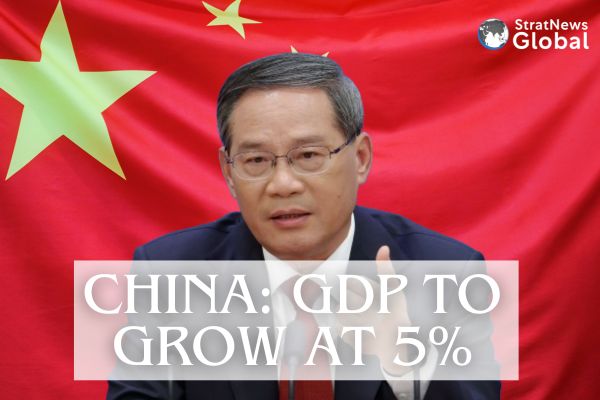The Chinese government has said that it sees the gross domestic product (GDP) growing by “around 5%” this year.
Premier Li Qiang while delivering his first government work report at China’s national legislature, the National People’s Congress (NPC) said that Beijing hopes to create more than 12 million new urban jobs, while keeping the urban unemployment rate at 5.5% and inflation at 3%.
Qiang admitted that the economic recovery will be tough and external factors have negatively affected the country’s development.
In order to attract more investment, Qiang promised to create a stable, transparent and predictable policy environment for enterprises.
The Chinese government has been trying to revive the sluggish economy by announcing a slew of measures.
Recently, Beijing is drafting a new bill that would boost and promote the private sector in the country
The proposed bill has been introduced into the lawmaking process by the country’s top legislature, the justice ministry and top economic planner, China’s state broadcaster CCTV yesterday said.
In July, Beijing released a 31-point guide that listed policy solutions and promised political backing for private firms.
Recently, China announced the largest cut to its key mortgage rate to shore up the crisis-hit property market.
Since 2021, the Chinese economy has been facing a major real estate downturn, when the government cracked down on developers’ borrowing.
The housing market, once contributing to the boom, has faced a slump, which has been triggered by a decline in both investments and sales of property. Over the past year or so, various major developers have defaulted on their debt. Leading the pack is Evergrande — China’s second largest homebuilder. It was ordered to liquidate last month.
The crisis has been a major blow to construction workers and home buyers. The impact of the crisis has also impacted the banking industry.
The Chinese government has stepped in to stem the tide, by including measures like slashing interest rates, reducing the size of down payments, encouraging banks to extend maturing loans to developers and loosening restrictions on home purchases in Chinese cities.
Beijing has suffered a bumpy recovery since the country’s zero-Covid policy was abandoned in December 2022, with the private sector and wage earners particularly hard hit in the past year.
In a career spanning three decades and counting, Ramananda (Ram to his friends) has been the foreign editor of The Telegraph, Outlook Magazine and the New Indian Express. He helped set up rediff.com’s editorial operations in San Jose and New York, helmed sify.com, and was the founder editor of India.com.
His work has featured in national and international publications like the Al Jazeera Centre for Studies, Global Times and Ashahi Shimbun. But his one constant over all these years, he says, has been the attempt to understand rising India’s place in the world.
He can rustle up a mean salad, his oil-less pepper chicken is to die for, and all it takes is some beer and rhythm and blues to rock his soul.
Talk to him about foreign and strategic affairs, media, South Asia, China, and of course India.





